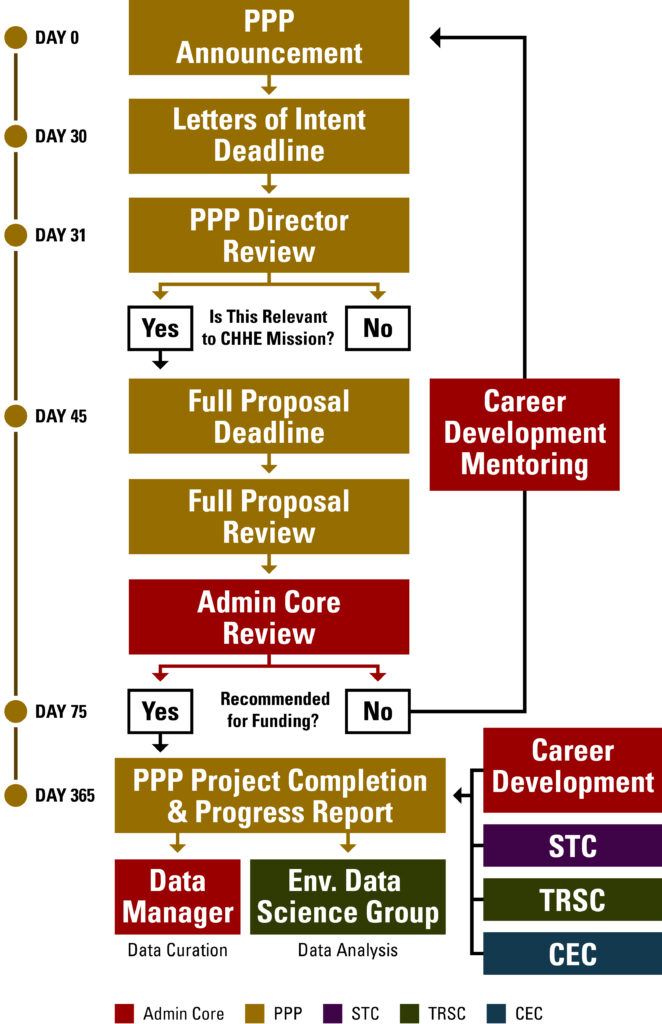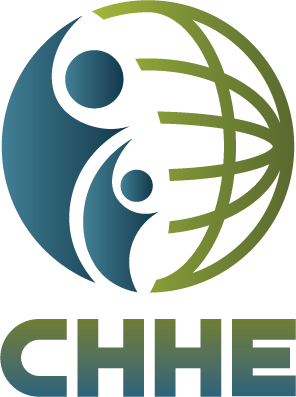
Pilot Project Program
Fostering collaborations, increasing multidisciplinary research and aiding in the career development of early stage investigators to advance environmental health research.
CHHE Pilot Project Program
The overarching goal of CHHE’s Pilot Project Program (PPP) is to provide support for research aimed at understanding the adverse impacts of environmental factors on human health and disease. We also aim to enhance the impact of environmental health research and increase the environmental health identity at NC State University, East Carolina University (ECU) Brody School of Medicine and North Carolina Central University (NCCU).
The PPP supports investigators who are initiating new interactions and building interdisciplinary bridges to advance discovery in EHS along the continuum from genes to populations within in the context of CHHE thematic research interest areas and mission.
- Genes, Environment and Precision Health
- Environmental Health Disparities
- Water and Emerging Challenges
- Behavior and Neuroscience
- Climate Change and Airborne Contaminants
CHHE PPP also supports high quality environmental health research outside of its thematic areas as well as high risk/high gain research addressing environmental health concerns and encourages the use of CHHE’s cores and resources. There are currently two Requests for Applications each year; Letters of Intent are announced February 1 in the spring and August 1 in the fall.
Letter of Intent Submission
If you would like to apply, you must first submit a letter of intent to this submission form found below.
Eligibility
CHHE PPP accepts applications from CHHE members as well as non-member faculty from NC State University, ECU and NCCU.
We encourage applications from:
- EHS investigators and non-traditional EHS investigators who are interested in expanding their research into new and innovative EHS research areas including high risk/high gain projects addressing environmental health concerns.
- Early stage investigators who seek extramural environmental health research funding, career development mentoring and access to cutting-edge core facilities.
- Community-engaged projects where CHHE members partner with community stakeholders to address environmental health concerns that align with the CHHE mission.

Pilot Project No-cost Extension Request
PPP awardees may extend the final budget period of the project when the following conditions are met:
- If no additional funds are required from CHHE
- If there will be no change in the project’s originally approved scope (Aims)
In order to mandate an extension the following criteria must be applicable:
- Additional time beyond the established expiration date is required due to unforeseen circumstances in access to samples, supplies or other required conditions.
If you are requesting a no cost extension, you are required to submit the request no later than one month before the expiration date of your project.
Inter-P30 UNC/NC State Rapid Response Initiative:
Special Release: Climate Impacts on Human Health in Western North Carolina
The UNC Center for Environmental Health and Susceptibility (CEHS) and the NC State Center for Human Health and the Environment (CHHE) NIEHS P30 Core Centers have funded a rapid response project addressing climate impacts on human health in Western North Carolina following Hurricane Helene, with an emphasis on water quality and health. This inter-P30 initiative includes meaningful collaboration between scientists at NC State and UNC Chapel Hill. Each Center allocated $25,000 toward the scientific aims of the project, and an additional $5,000 each toward the UNC and NC State P30 Community Engagement Cores to work in tandem with scientists in engaging community stakeholders. These scientific teams will incorporate a diverse breadth of expertise, including population and environmental health scientists.
The project funding period is from 02/01/2025 – 01/31/2026
2025 Awardees: “Forming the Post Helene Response (PoWR) Team”

The team, led by Jackie MacDonald Gibson (NC State) and Rebecca Fry (UNC-CH) was recently funded by the CEHS/CHHE Inter-P30 Rapid Response Initiative. This community-based participatory work will use pre-hurricane data and recently collected samples to conduct drinking water analyses targeting organic and inorganic chemicals and microbial contaminants, with report-back to those involved. The work will address concerns identified to date by community partners in Western NC.
